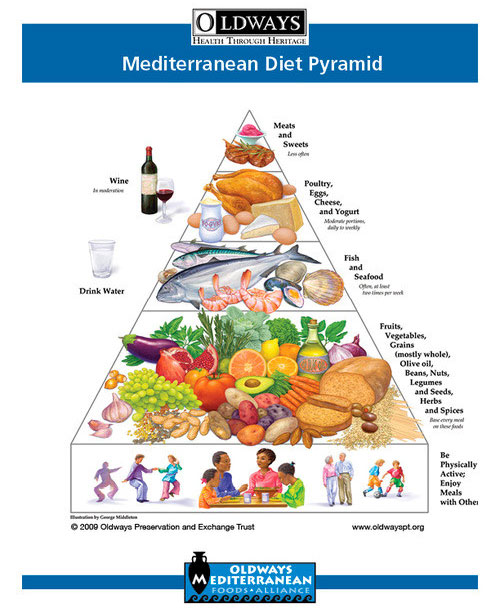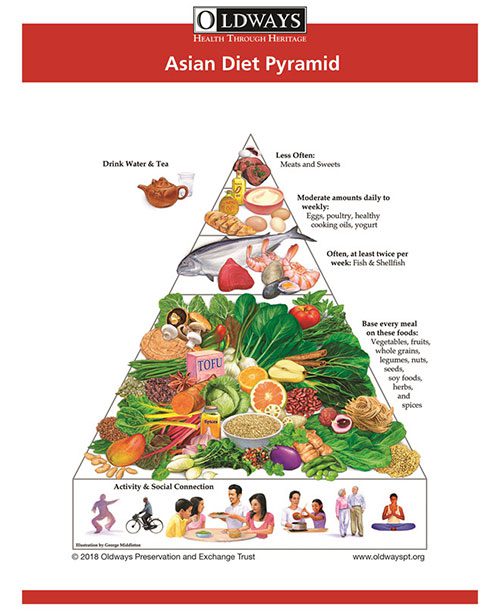Ranking first in the list of the best diets of 2019, the Mediterranean diet is not just a diet but is also considered a healthy lifestyle.
The Secrets of Mediterranean People
People from the Mediterranean region are often recognized for their longer lifespans and lower incidences of diseases such as cancer and heart disease compared to Americans. Their secret lies in an active lifestyle, weight management, and a unique diet: consuming less red meat, sugar, and saturated fats, while eating plenty of nuts and other healthy foods.

The Mediterranean diet is a diverse eating method. (Photo: Mindfood).
The Mediterranean diet offers numerous health benefits, including weight loss, heart and brain health, cancer prevention, and diabetes management. With this diet, you can lose weight while also avoiding chronic diseases.
Decoding the Mediterranean Food Pyramid
However, there isn’t just one Mediterranean diet, as Greeks, Italians, French, and Spaniards all have different eating habits. The food experts at Oldways in Boston have created a very understandable Mediterranean food pyramid for those looking to adopt this diet.

The typical Mediterranean food pyramid provided by Oldways. (Photo: Oldways).
The Mediterranean food pyramid emphasizes foods such as fruits, vegetables, whole grains, legumes, olive oil, herbs, and various spices. Next, it encourages the consumption of protein sources like fish and seafood at least a few times a week. Poultry, eggs, cheese, and yogurt should be eaten in moderation, while sweets and red meat (beef) should be limited, along with red wine.
Additionally, this diet encourages you to maintain physical activity and regular exercise. However, it’s important to remember that this pyramid is a food model, not a strict diet, so you must determine your daily caloric intake to lose or maintain weight.
Easy to Implement and Create a Balanced Lifestyle
The cost of following the Mediterranean diet depends on how you plan and arrange the foods accordingly. Olive oil, nuts, fish, and fresh produce can be pricey, but you can mitigate some costs with proper budgeting.

The Mediterranean food pyramid designed by Oldways specifically for Asians, suited to the lifestyle, foods, and habits of this continent. (Photo: Oldways).
While some may worry that the Mediterranean diet is relatively high in fat, making weight loss difficult, many studies have shown this to be inaccurate. The principle of weight loss still relies on the basic rule – calories consumed must be less than calories burned.
In fact, the Mediterranean diet does not completely ban certain food groups, allowing for long-term adherence. It is also a convenient diet with diverse menus, non-harmful to health, saving time and costs when planned effectively.
Experts also indicate that exercise is an essential factor in the Mediterranean diet but does not necessarily require high-intensity workouts. Adults are advised to spend at least 2.5 hours a week exercising (at a moderate intensity, combining cardio and strength training to enhance fat burning).
The Mediterranean Lifestyle May Reduce Early Death Risk by 29%
Recently, a study published on August 16 in the Mayo Clinic Proceedings, conducted by La Universidad Autónoma de Madrid and the Harvard T.H. Chan School of Public Health, examined the living habits of residents in countries like Italy and Spain.
The Mediterranean diet, recognized by US News & World Report as the best diet for the sixth consecutive year, emphasizes the importance of sourcing quality ingredients and filling your plate with nutrient-rich foods and grains.
It encompasses the traditional diets of 21 countries bordering the Mediterranean Sea, including Italy, Greece, Croatia, Turkey, and Monaco – known for their abundant fresh vegetables, fruits, fish, nuts, and olives.
The Mediterranean diet highlights lean proteins such as fish and chicken, fresh produce, and of course, antioxidant-rich olive oil. Beyond the diet, researchers identified a “Mediterranean lifestyle“ that particularly promotes rest, physical activity, and meaningful social connections.
“Individuals adhering to the Mediterranean lifestyle have lower risks of death from all causes and cancer,” the study states. “Those who emphasize rest, exercise, and socializing with friends have a lower risk of death from cardiovascular diseases.”
Healthy Foods According to the Mediterranean Diet
Your Mediterranean diet menu should include the following foods:
- Vegetables: Tomatoes, broccoli, kale, spinach, onions, cauliflower, carrots, Brussels sprouts, cucumbers…
- Fruits: Apples, bananas, oranges, pears, strawberries, grapes, figs, watermelon, peaches, avocados…
- Nuts and seeds: Almonds, walnuts, macadamia nuts, hazelnuts, cashews, sunflower seeds, pumpkin seeds…
- Legumes: Green beans, red beans, black beans, peas, lentils, peanuts, chickpeas…
- Tubers: Potatoes, sweet potatoes, radishes (white or red), taro…
- Whole grains: Oats, brown rice, quinoa, barley, corn, buckwheat, whole wheat, whole grain bread, whole grain pasta…
- Seafood: Salmon, sardines, trout, tuna, mackerel, shrimp, oysters, clams, crabs…
- Poultry: Chicken, duck…
- Eggs: Chicken eggs, quail eggs, duck eggs…
- Dairy products: Cheese, yogurt…
- Herbs and spices: Garlic, basil, mint, rosemary, sage, nutmeg, bay leaves, pepper…
- Healthy fats: Extra virgin olive oil, avocado oil…
Foods to Avoid on the Mediterranean Diet
- Sugary Foods: Sodas, candies, ice cream, sugary snacks…
- Refined Grains: White bread, pasta made from refined wheat.
- Trans Fats: Margarine and many other processed foods.
- Refined Oils: Soybean oil, canola oil, cottonseed oil…
- Processed Meats: Pre-made sausages like smoked or grilled sausage.
Benefits of the Mediterranean Diet for IVF
Traditional Mediterranean Meals Help Prevent Diabetes
What Level of Civilization Has Humanity Reached According to Kardashev’s Civilizational Scale?




















































